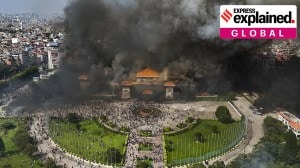A law to legalise the illegal
Even the title of the law, ‘The Delhi Laws (Special Provisions) Act’, is misleading

The English laws punish vice; the Chinese laws do more, they reward virtue. That was Oliver Goldsmith writing a long time ago. Looking at the Delhi Laws (Special Provisions) Act 2006, it appears that the laws in India do much more — they reward vice by legalising the violations of law committed with impunity by all concerned — the public, the building mafia, the local authorities and the politicians.
Clearly, the Government of India was in an unseemly hurry in legislating and passing the Act. Not only was it exempted from the mandatory seven-day notice for parliamentary consideration, it was extremely poorly drafted. Even the title of the legislation was misleading. It gave no idea about the purpose of the legislation. The law — which has just come into force — does not use the term “unauthorised constructions” anywhere. It prefers, instead, to deploy the phrase “unauthorised development”. The Bill’s statement of objects and reasons put a considerable spin on the issue. It argued that this law is necessary in order to enable the government to take all possible measures for the “finalisation of norms, policy guidelines and feasible strategies” to deal with the problems of unauthorised constructions so that, as Section 3 of the Act says, the “development of Delhi can take place in a sustainable and planned manner”. Section 3 gives one year to the government to frame relevant policies. It prescribes “status quo as on the 1st day of January, 2006 shall be maintained in respect of categories of unauthorised development” mentioned in the law.
The law raises more questions than it answers. The problem of illegal constructions and encroachments is not a new one for Delhi. Why, then, does the government now require a year to design strategies to deal with the problem? How can we expect it to do so when it has not designed such strategies all these years? And why does it need a law to do this?
Laws relating to unauthorised constructions or their demolition have always been applied randomly and unequally. In Delhi, these matters are regulated as per the provisions of the Unified Building Bye-laws, 1983. The fact that the local authorities either did not enforce the bye-laws, or overlooked their violations, is obvious from the large-scale court-ordered sealing of illegal properties and their demolition. Jaipal Reddy, the Union urban development minister, even admitted in the Lok Sabha on March 6 that “the extent and magnitude of violations of unauthorised construction and misuse of premises is assessed to be huge and the number of families likely to be affected may be in lakhs”. Obviously, all this did not happen overnight, so why didn’t the government take action in time? That the demolition issue had come to such a sorry pass because of persistent political connivance and corruption, as some have pointed out, may be a part of the explanation.
Even when the demolitions were going on, the courts had to direct the Municipal Corporation of Delhi and other local bodies on many occasions not to adopt a “pick and choose” policy and to initiate action against the big fish which had violated building laws with impunity. And the Centre is not alone in formulating a law to regularise violations of the law. Maharastra did it earlier when it promulgated an ordinance to regularise 855 illegal buildings in Ulhasnagar that were being threatened with demolition under the orders of the Bombay High Court. Here, too, politicians cutting across party lines supported the move.
This brings up the question: why are politicians so keen to stop demolitions? Is it because of a concern for the hardships caused to people? To conclude this would be naive. Politicians stand to lose directly from such measures because many of them own illegal buildings themselves, besides having encroachments to protect. It is a question of their very survival as men and women of money and influence. As Henry Kissinger once put it, tongue firmly in cheek: “The illegal we do immediately. The unconstitutional takes a little longer.”
The writer is advisor, Commonwealth Human Rights Initiative, Delhi gpjoshi@gmail.com
Photos





- 01
- 02
- 03
- 04
- 05

























